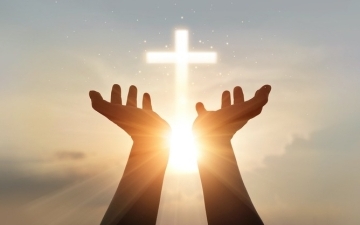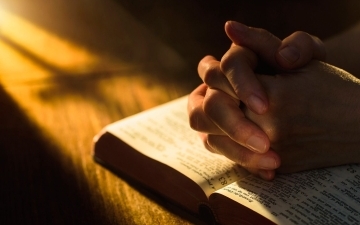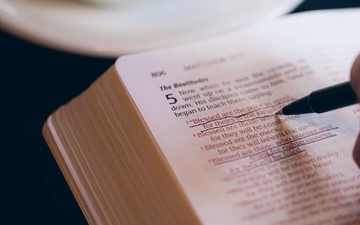How did Noah’s Ark survive the Great Flood, and what does it symbolize?
The story of Noah's Ark is one of the most well-known accounts in the Bible, illustrating both the judgment and mercy of God. It takes place in the book of Genesis, chapters 6 through 9, where God decides to send a great flood to cleanse the earth of widespread corruption and violence. In the midst of this divine judgment, Noah and his family are chosen to build an ark and preserve life. But how did Noah’s Ark manage to survive such a massive flood, and what deeper meaning does this story hold? Let’s explore the construction of the ark, its survival through the floodwaters, and the symbolic significance of this story.
How Did Noah’s Ark Survive the Great Flood?
The survival of Noah’s Ark during the Great Flood is a testament to both the divine guidance Noah received and the detailed instructions he followed in building the ark. Here are some key aspects that contributed to the ark’s ability to endure the flood:
1. Divine Instructions and Design
According to Genesis 6:14-16, God gave Noah very specific instructions on how to build the ark. The dimensions were to be 300 cubits long, 50 cubits wide, and 30 cubits high (approximately 450 feet long, 75 feet wide, and 45 feet high). The ark was to be constructed of “gopher wood” (likely a type of durable timber) and coated with pitch both inside and out to make it waterproof.
The design of the ark was rectangular and stable, resembling more of a large barge than a typical ship. This shape was ideal for surviving rough waters, as it provided stability rather than speed or maneuverability. The focus was on the ark’s ability to float and withstand the tumultuous conditions of the flood, not on navigation.
The three levels of the ark provided ample space to house Noah’s family, various pairs of animals, and sufficient food and provisions to sustain them throughout the duration of the flood, which lasted over a year. This careful attention to detail ensured the ark's capacity to endure the lengthy time at sea.
2. Divine Protection
While Noah was obedient in following God’s building instructions, the ultimate protection for the ark came from God Himself. Genesis 7:16 says that once Noah, his family, and the animals entered the ark, “the Lord shut him in.” This act symbolized God’s direct involvement in sealing the ark and safeguarding its inhabitants.
Throughout the flood, God’s providence is seen in the way the ark is preserved amidst the chaos of the deluge. The Bible describes how the waters “prevailed upon the earth” (Genesis 7:18-19), covering even the highest mountains, yet the ark remained afloat. This illustrates that while Noah was responsible for constructing the ark, its survival depended on God’s sovereign power over the elements.
3. Duration of the Flood and the Recurrence of Dry Land
The floodwaters rose for 40 days and nights, covering the earth (Genesis 7:17). However, the waters eventually receded, and the ark came to rest on the mountains of Ararat (Genesis 8:4). The receding of the floodwaters allowed dry land to reappear, making it possible for Noah, his family, and the animals to safely disembark and begin life anew on a cleansed earth.
The entire timeline of the flood—from the rising of the waters to the eventual drying—emphasizes the patience and endurance required by Noah and his family. It was God who caused the waters to recede and directed the ark to a safe resting place, showing that He was in control throughout the entire process.
What Does Noah’s Ark Symbolize?
Beyond the historical account of Noah’s Ark, the story is rich with symbolism and meaning that has resonated with people of faith throughout history. Here are some of the key themes and symbols associated with Noah’s Ark:
1. Judgment and Mercy
The story of the flood begins with God’s judgment on a world filled with wickedness and violence. Genesis 6:5-7 describes how “the wickedness of man was great in the earth,” prompting God to send a flood to cleanse the earth. Yet, in the midst of judgment, God extends mercy to Noah and his family because “Noah found favor in the eyes of the Lord” (Genesis 6:8).
The ark serves as a symbol of God’s mercy and salvation. While the flood represents the righteous judgment of God against sin, the ark represents the refuge and protection that God provides for those who are faithful. It is a reminder that even when God’s justice is displayed, His desire is to save and preserve life.
2. Obedience and Faith
Noah’s obedience is a central theme in the story. He followed God’s instructions meticulously, despite the daunting nature of the task and the likelihood that he faced ridicule or disbelief from others. Hebrews 11:7 praises Noah for his faith, saying that “by faith Noah, being warned of God of things not seen as yet, moved with fear, prepared an ark to the saving of his house.”
Noah’s faith in God’s word, even when it contradicted visible reality (such as the coming of a flood when rain had never been seen), makes him a powerful example of trust in God’s promises. The story of Noah’s Ark reminds us that true faith often requires stepping out in obedience to God, even when His commands seem difficult or incomprehensible.
3. A New Beginning and Covenant
After the flood, Noah and his family emerged to a cleansed earth, symbolizing a new beginning for humanity. God established a covenant with Noah, promising never to destroy the earth with a flood again and setting a rainbow as a sign of this covenant (Genesis 9:12-17). This covenant highlights God’s desire for relationship with His creation and His promise to sustain life on earth.
The story of the ark also points to themes of renewal and hope. Just as Noah and his family were given a fresh start, the flood serves as a reminder that God’s desire is to renew and restore rather than to destroy. It speaks of God’s ongoing commitment to His creation and His faithfulness to keep His promises.
4. A Foreshadowing of Christ’s Salvation
In Christian theology, Noah’s Ark is often seen as a foreshadowing of the salvation that comes through Jesus Christ. Just as the ark provided physical salvation for Noah and his family from the waters of judgment, Christ provides spiritual salvation from the consequences of sin. The apostle Peter draws this parallel in 1 Peter 3:20-21, likening the waters of the flood to the waters of baptism, which symbolize the believer’s identification with Christ’s death and resurrection.
The ark represents a place of refuge and safety, just as faith in Jesus is seen as a refuge for believers from the judgment of sin. Through this symbolism, the story of Noah’s Ark takes on a deeper meaning, pointing to the ultimate hope of redemption through Jesus.
A Story of Faith and Redemption
The story of Noah’s Ark is a profound account of faith, judgment, and redemption. It teaches us about the seriousness of sin and God’s righteous judgment, but it also reveals His desire to save and restore those who trust in Him. The survival of the ark through the floodwaters is not just a testament to Noah’s obedience, but to God’s unfailing power and mercy.
In reflecting on the symbolism of Noah’s Ark, we are reminded that God’s promises are steadfast, that He is both just and merciful, and that through faith, we can find refuge in Him. Just as Noah’s Ark carried its passengers through the storm to a new beginning, God’s grace carries us through life’s challenges, offering hope and the promise of renewal.
Contributions from Bible History Online and Ancient History.
Related Posts
Understanding Grace: God’s Unconditional Love and Forgiveness
In the tapestry of Christian theology, few concepts are as profound and transformative as grace. Grace is often described as God's unmerited favor, an undeserved gift that flows from His boundless love and mercy. It's a theme woven throughout the Bible, representing the heart of the Christian faith. In this...
Read MoreUnpacking the Parables: Discovering Hidden Truths in Jesus’ Stories
The parables of Jesus are like treasure chests filled with timeless wisdom and profound truths. These short, simple stories, often drawn from everyday life, have the power to illuminate the deepest mysteries of faith and human existence. They challenge our understanding, provoke thought, and reveal profound insights into the Kingdom...
Read MoreThe Prodigal Son: A Story of Redemption and God’s Unending Love
One of the most beloved parables in the Bible, the story of the Prodigal Son, as told by Jesus in Luke 15:11-32, is a timeless narrative that continues to resonate with people of all backgrounds and beliefs. This parable beautifully illustrates the concepts of redemption, forgiveness, and the boundless love...
Read MoreLiving a Christ-Centered Life: Practical Tips for Everyday Faith
In a world filled with distractions and demands, living a Christ-centered life is a profound commitment that requires intentionality and purpose. It means aligning your thoughts, actions, and priorities with the teachings and example of Jesus Christ. While this may seem challenging in the busyness of daily life, it is...
Read MoreExploring the Miracles of Jesus: Lessons of Faith and Compassion
The life and ministry of Jesus Christ are marked by a series of extraordinary events that defy the laws of nature—miracles. These miracles are not merely displays of divine power but profound teachings that offer lessons of faith, compassion, and the boundless love of God. In this article, we embark...
Read MoreThe Role of Scripture in Spiritual Growth: A Guide to Bible Study
Scripture, in its essence, is more than ink on pages or words in a book. It is a living, breathing testament to the wisdom, guidance, and divine revelation that have shaped the lives of countless believers throughout history. For Christians, the Bible is a cornerstone of faith and a vital...
Read MoreOvercoming Doubt: Building a Firm Foundation in Your Christian Journey
Doubt is a natural part of the human experience, and it can often find its way into our spiritual lives. As Christians, we may wrestle with doubts about our faith, God's existence, or the meaning of our journey. However, doubt can also be an opportunity for growth, deepening our faith,...
Read MoreWhy Advent Is Important for Christians and How to Celebrate It
As the holiday season approaches, many Christians look forward to one of the most meaningful times of the year Advent. This beautiful four-week period before Christmas is more than a countdown of days. Advent is a time of reflection, hope, preparation and joyful anticipation of the birth of Jesus. In...
Read MoreWalking by Faith: Navigating Life’s Challenges with Biblical Wisdom
Life is an unpredictable journey, filled with highs and lows, joys and sorrows, and unexpected twists and turns. In the face of life's challenges, people often turn to their faith for guidance and strength. For Christians, the Bible serves as a timeless source of wisdom and inspiration. It offers invaluable...
Read MoreThe Power of Prayer: How to Strengthen Your Connection with God
Prayer is a bridge that connects the finite with the infinite, the earthly with the divine. It is a profound and essential practice in virtually every religious tradition, serving as a means to seek guidance, offer gratitude, find solace, and deepen one's relationship with a higher power. In the Christian...
Read MoreFinding Hope in Times of Crisis: Trusting God’s Plan for Your Life
Life often presents us with unexpected challenges and crises that can leave us feeling overwhelmed, anxious, and uncertain about the future. In such moments, finding hope can be a lifeline that sustains us through the darkest times. For those who place their faith in God, hope is not just wishful...
Read More















